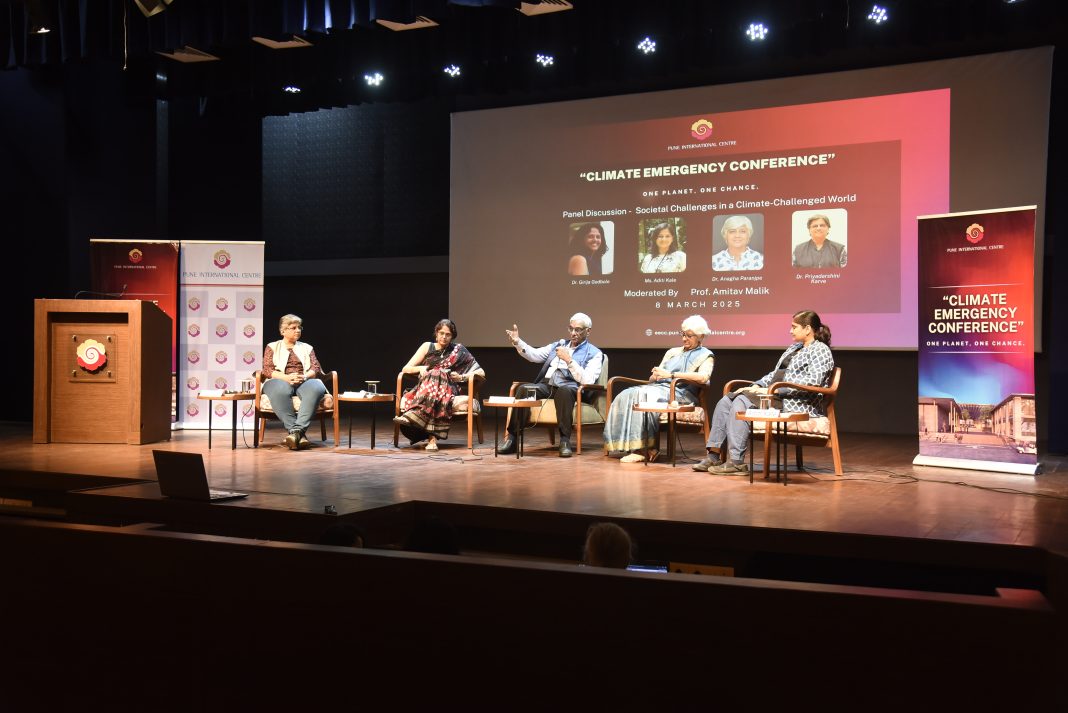The role of women in tackling climate change was a key focus at the PIC Climate Emergency Conference. The event was held at the PIC Campus on March 8. It marked the observance of International Women’s Day. An all-women panel led the discussion on climate challenges. They highlighted the links between climate, social, economic, and governance issues. The discussion emphasized the need for inclusive and knowledge-driven climate action.
Women at the Forefront of Climate Resilience
The discussion was chaired by Prof. Amitav Mallik, Founder Member and Trustee of PIC and Convenor of the Conference. Panelists highlighted the pressing need for sustainable solutions that consider social equity, economic stability, and environmental governance.
Dr. Girija Godbole, GHOD Water Fund Lead, discussed the social impact of climate change. She explained that it worsens inequalities across economic, gender, and urban-rural lines. She highlighted how marginalized communities are disproportionately affected. Dr. Godbole stressed the need for their greater representation in decision-making. She advocated for a more inclusive approach to climate policies. Ensuring diverse voices in policy formation is crucial for effective climate action.
Addressing the psychological impact of climate change, Aditi Kale, Director at CCP Environmental Foundation, spoke about the growing issue of eco-anxiety. She underscored the importance of resilience, stating that it is not a luxury but a necessity. Kale stressed the role of conscious consumerism and the integration of climate awareness into professional sectors to drive tangible change.

Anagha Paranjpe, Founder of VK:e, a firm specializing in sustainable architecture, highlighted the disproportionate environmental footprint of urban centers. Despite occupying only 3% of India’s land, cities contribute to 65% of the country’s GDP. She advocated for stronger investment in urban governance to ensure sustainable economic growth, reducing the environmental burden while maintaining progress.
Dr. Priyadarshini Karve, CEO of Clean Energy Access Network, posed a compelling question: “Can thought leaders elevate climate literacy to a level where public demand forces politics to break free from its dependence on petroleum?” She urged for greater awareness and policy-driven action to reduce reliance on fossil fuels.
The discussion concluded with a strong call for climate-conscious governance, urging individuals, policymakers, and industry leaders to take decisive steps toward an inclusive and sustainable future.
Industry’s Role in Sustainable Practices
Sustainability in industry was a focal point of the panel discussion on ‘Moving to Lasting Sustainability,’ moderated by Dr. Gurudas Nulkar, Director of the Centre for Sustainable Development at Gokhale Institute of Politics and Economics. The session explored viable pathways to reducing carbon emissions, energy efficiency, and innovative solutions for industrial sustainability.
Shantanu Pandit, Chair of Climate Change at PIC, emphasized optimizing power consumption, stating that better energy management and power quality improvements could reduce industrial CO2 emissions by 20%.
Milon Nag, Managing Director at K.K. Nag Pvt. Ltd., discussed the challenges of sustainability in the plastics industry. While thermoplastics can be recycled, he advocated for reducing energy usage in plastic manufacturing and enhancing recycling mechanisms to make the sector more sustainable.
Mahesh Deodhar, Head of the Centre for Sustainable Energy and Mobility at PIC, highlighted India’s nuclear energy potential. He outlined a roadmap to scale India’s nuclear energy capacity to 6,500 gigawatts by 2047, reducing dependence on fossil fuels and enhancing energy security.
Nitant Mate, Director at SeeGreen Products Pvt. Ltd., introduced biomass as an alternative energy source. He explained that converting 300 tons of biomass produces 300,000 meters of gas, offering a cleaner and more sustainable fuel solution.
As part of the sustainability push, the panel introduced the “Nakshatra 27” initiative, encouraging the planting of 27 trees per 2000 sq. ft. of land to promote environmental restoration. The session concluded with a strong emphasis on collective action, technological advancements, and policy support to foster a greener industrial future.
Redefining Economic Growth for Sustainability and Women’s Empowerment
In a session on ‘Challenges of Real Sustainable Development and Future Directions,’ Dr. Gurudas Nulkar discussed economic growth and resource use. He highlighted the need to separate growth from resource exploitation. He emphasized that more than 200 mines in India lack computerized systems. This results in inefficient extraction of minerals. It also causes severe environmental damage. Women in rural communities suffer the most as they depend on natural resources.
Dr. Nulkar proposed alternative economic strategies, advocating for a circular economy and service-based models such as leasing over selling. He emphasized the role of women entrepreneurs in promoting sustainable business models. Citing the example of Xerox’s photocopier leasing model, he demonstrated how sustainability and profitability can go hand in hand.
He also addressed India’s renewable energy transition, stressing the country’s heavy reliance on imported critical minerals. To enhance self-sufficiency, he called for large-scale projects to cultivate biomass and leverage the carbon cycle for sustainable energy solutions. He underscored the importance of empowering women in the renewable energy sector, ensuring their active participation in driving sustainable solutions.
Key action points from the session included:
- Exploring nationwide projects for biomass cultivation as a renewable energy source.
- Reevaluating India’s renewable energy strategy to maximize self-reliance.
- Promoting sustainable economic models, such as circular economies and service-based frameworks.
Dr. Nulkar strongly urged a paradigm shift toward a “green GDP,” aligning economic growth with sustainability and resource efficiency to balance development with environmental responsibility.
